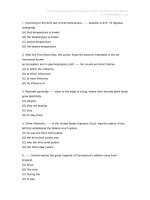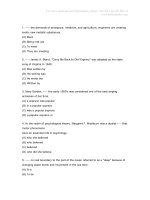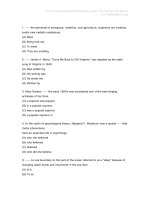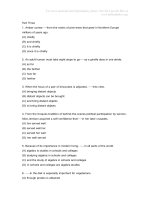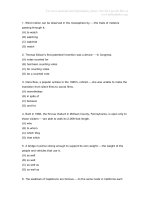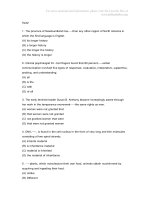Reading exercise Bài tập luyện reading
Bạn đang xem bản rút gọn của tài liệu. Xem và tải ngay bản đầy đủ của tài liệu tại đây (55.08 KB, 3 trang )
Exercise 1. Read the following passage and mark the letter A, B, C, or D on your
answer sheet to indicate the correct word or phrase that best fits each of the
numbered blanks.
One definition of generational conflict locates it in rebellion against parental authority, or in
the failure of parents and their adolescent youngsters to understand and (1)______ On this
particular issue, there is, as it happens, (2)______ with each other. evidence, and all of it
suggests strongly that there is no extensive degree of alienation between parents and their
children. Vern Bengtson, one of the most careful scholars in this area, has collected data from
more than 500 students (3)______ in three Southern California colleges. About 80 percent of
them report generally close and friendly relationships with their parents; specifically, 79
percent feel somewhat close or very close, 81 percent regard communication (4)______ good,
and 78 percent feel that their parents understand then all or most of the essentially similar
findings have emerged from Samuel Lubell's perceptive studies of college youth. He reports
that only about 10 percent of the students he interviewed were in serious discord with their
parents, and there (5)______, in most of these cases, a long history of family tension. Any
clinician working with college-age students would agree; among the rebellious or alienated,
we find that their troubles with their families go back a long way and surfaced well before the
college years.
(Source: />
Question 1.
Question 2.
Question 3.
Question 4.
Question 5.
A. express B. communicate
A. abundant B. enormous
A. enrol
B. enrols
A. against
B. about
A. were
B. was
C. stipulate
C. extravagant
C. enrolled
C. like
C. are
D. underestimate
D. luxurious
D. to enroll
D. as
D. is
Exercise 2. Read the following passage and mark the letter A, B, C, or D on your
answer sheet to indicate the correct answer to each of the questions.
Parent/teen conflict is common, the important thing is for parents to assure their teen it is safe
to have their say and that you will respond. It isn't a calm and sunny relationship with a
parent that gives a teenager the strength he or she needs - it is an open, trusting relationship
that offers respect even in the face of heated disagreement. These conflicts often help teens
hone their distinctive identities, but parents should follow some general rules:
Avoid humiliation: shaming your son or daughter by outlining their faults will reinforce
divisions between you. Teenagers list "being judged» as among their pet peeves with parents.
Judging and listening are mutually exclusive.
Minimise problems: avoid saying things such as "You'll forget all about this in no time", or,
"you're too young to be serious about this". Instead say: "yes, this makes sense to me" (not "I
feel the same" or "l know just what you mean").
Show your interest: skip over the tension between you and focus on something positive.
Offer to help with practical things, such as getting him the school supplies he needs or buying
her a magazine or book you know she would like.
Present a different perspective: "What about looking at it another way?" is more likely to
be accepted than "that's not how it is".
Explain negative responses: when you object to something a daughter says or wants to do,
explain your response in terms of your feelings and beliefs: "when you talk to me like that I
feel...." rather than, "you have a bad attitude".
(Source: />Question 1. What does the passage mainly discuss?
A. How parents can win arguments with their children
B. Parents humiliating their teenage children
C. Strategies to minimise conflicts between parents and teens
D. How teens can avoid quarrels with parents
Question 2. What should parents do to if objecting to their children's idea?
A. Responding in relation to their feelings and beliefs
B. Humiliating their teens
C. Ignoring the idea and giving punishments
D. Making a fuss about the problems
Question 3. Which of the following is closest in meaning to "sunny" as used in the
passage?
A. shiny
B. with sunshine
C. friendly
D. warm
Question 4, Which of the following is closest in meaning to "reinforce" as used in the
passage?
A. weaken
B. enlighten
C. lessen
D. deepen
Question 5. Which of the following is NOT mentioned as a rule parents should follow to
help teens improve their identities?
A. elaborating negative responses
C. expressing interest
B. ridiculing the ideas of children
D. minising problems
Exercise 1
1.B
2.A
3.C
4.D
5.B
Exercise 2
1.C
2.A
3.C
4.D
5.B




